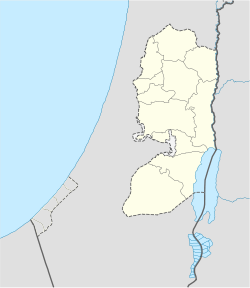Khirbet Tana et-Tahta
 Aerial view of Tana et-Tahta | |
| Alternative name | Tana et-Tahta |
|---|---|
| Region | West Bank |
| Coordinates | 32°09′09″N 35°23′44″E / 32.152418°N 35.395459°E |
| Type | settlement |
| History | |
| Periods | Iron Age, Roman period, Byzantine period |
| Cultures | Israelites, Samaritans |
| Site notes | |
| Archaeologists | Manasseh Hill Country Survey |
| Condition | In ruins |
Khirbet Tana et-Tahta is an archeological site located in the West Bank. It lies near the Israeli settlement of Mekhora.
Biblical identification[edit]
Khirbet Tana et-Tahta is identified with Taanath Shiloh (Hebrew: תַּאֲנַת שִׁלֹה), a place mentioned in the Hebrew Bible as one of the landmarks on the boundary of Tribe of Ephraim.[1][2] Taanath Shiloh was previously identified with the nearby site of Khirbet Tana et-Foqa, but based on archeological evidence, Tana et-Tahta seems like the more probable candidate.[3][4]
Yanun, believed by some archeologists to be the location of biblical Janohah, lies nearby.
Archeology[edit]
The site was surveyed by the Manasseh Hill Country Survey and no orderly excavation was conducted.[3] The survey documented the remains of a multi-period settlement that was proposed to be identified with the biblical town of Taanath Shiloh and with Thena, a city mentioned in several sources from the Roman and Byzantine periods.[5]
In his Onomasticon, Eusebius mentions a place called Thena on the road to the Jordan river, around 10 milestones east of Neapolis. Ptolemy describes Thena, as a town in Samaria.[6]
The remains of the Roman-Byzantine city covered an area of over 100 dunams across the summit and also on the slope north of it. The ethnic identity of its residents remains unclear; it is believed that they were Samaritans or that it had a mixed population of Samaritans and other ethnicities.
Significant remains at the site include a public structure (maybe a Samaritan synagogue), several underground systems, burial caves and a water supply system which has its origins in the Ein al-Foqa spring. The remains of a Roman road have been also discovered near Khirbet Tana et-Tahta; the location of several Iron Age sites nearby suggests that the road dates back to biblical times.[4]
References[edit]
- ^ Joshua 16:6–7
- ^ Bar, Shay; Zertal, Adam (2021-03-25). The Manasseh Hill Country Survey Volume 6. BRILL. pp. 74–75. ISBN 978-90-04-46323-3.
- ^ a b Bar, Shay; Zertal, Adam (2021-03-25). The Manasseh Hill Country Survey Volume 6. BRILL. pp. 74–75. ISBN 978-90-04-46323-3.
- ^ a b Dorsey, David A. (1987). "Shechem and the Road Network of Central Samaria". Bulletin of the American Schools of Oriental Research (268): 57–70. doi:10.2307/1356994. ISSN 0003-097X.
- ^ "Bible Map: Taanath-shiloh". bibleatlas.org. Retrieved 2022-05-04.
- ^ "Taanath-shiloh in the International Standard Bible Encyclopedia". International Standard Bible Encyclopedia Online. Retrieved 2022-05-04.

